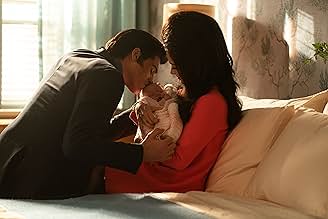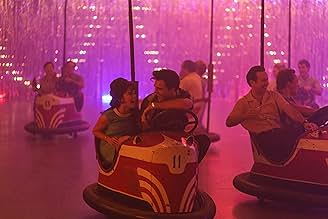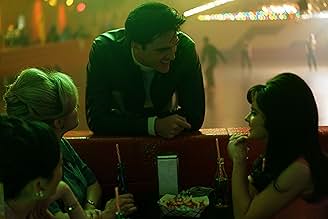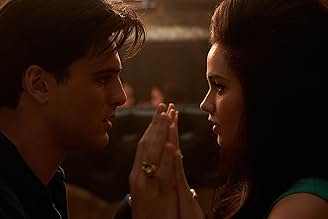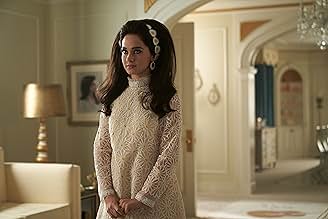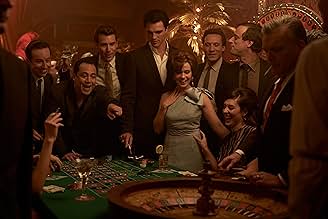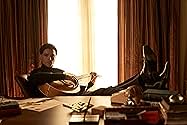L'adolescente Priscilla Beaulieu incontra Elvis Presley, ma l'uomo che è già una fulminea superstar del rock and roll, diventa qualcuno del tutto inaspettato nei momenti privati. Migliori am... Leggi tuttoL'adolescente Priscilla Beaulieu incontra Elvis Presley, ma l'uomo che è già una fulminea superstar del rock and roll, diventa qualcuno del tutto inaspettato nei momenti privati. Migliori amici, vulnerabili e alleati nella solitudine.L'adolescente Priscilla Beaulieu incontra Elvis Presley, ma l'uomo che è già una fulminea superstar del rock and roll, diventa qualcuno del tutto inaspettato nei momenti privati. Migliori amici, vulnerabili e alleati nella solitudine.
- Premi
- 6 vittorie e 35 candidature
Dan Beirne
- Joe
- (as Daniel Beirne)
Trama
Lo sapevi?
- QuizElvis Presley Enterprises declined both their approval for Sofia Coppola's film and their permission to use Elvis Presley's songs in the film. Coppola then took to creative alternatives, including contemporary music by her husband's band, Phoenix, and cover versions of songs from the film's era.
- BlooperThe title superimposed over the opening scene is "US Air Force Base West Germany 1959" over an image of a 50 star flag. This should have been a 48 or 49 star flag. Although Hawaii had been admitted to the union on August 21, 1959, the new flag was not officially raised until July 4, 1960.
- Curiosità sui creditiA photo of the crew is shown after the end credits.
- ConnessioniFeatured in The 7PM Project: Episodio datato 26 gennaio 2024 (2024)
- Colonne sonoreGoing Home
Written by Alice Coltrane and Carlos Santana
Performed by Alice Coltrane
Courtesy of Verve Records under license from Universal Music Enterprises
Recensione in evidenza
It is 1949, and American teenager Priscilla Beaulieu is in Germany with her parents. At a party one night, she meets Elvis Presley, who is stationed in the same military base as her father. The King is drawn to her, while she is smitten by his down-to-earth charm and seemingly genuine humanity. As time goes on, the two forge a relationship, and by 1963, she is living with him in Memphis. However, being The King's wife proves more difficult than she imagined, and far more lonesome.
Written and directed by Sofia Coppola, and based on 'Elvis and Me' by Priscilla Presley and Sandra Harmon, 'Priscilla' is a visually evocative drama both striking and flawed. Firstly, the title is something of a misnomer, as this is not the story of Priscilla Presley's life, rather an overview of the years she spent with Elvis (one wonders why the source material's title was not retained). The narrative focuses on her growing isolation, trapped in Graceland, at the beck and call of her controlling husband. However, due to Coppola's cold approach to the themes of agency and control, her examination of same leaves one oddly unmoved.
Moreover, despite the fact that she is ostensibly the central character, we aren't offered insight into Priscilla's motivations, or aspirations, nor does she have much of a personality. She is a soft-spoken, kind-hearted girl at the beginning and- for all intents and purposes- the very same at the end. Coppola's dialogue lacks wit, while Sarah Flack's ponderous editing leaves proceedings feeling lethargic- all the more so due to the dearth of characterisation and dialogue therein.
Some critics are quick to state that the film is purposefully superficial, that Coppola is interested only in the surface level. By focusing on the skin, as it were, and not the heart beneath, she re-enforces the idea that everything in Elvis's life was an easily purchasable object, even Priscilla. However, as the title would suggest, this is not meant to be a movie about Elvis. Therefore, the scant character development or depth with regard to Priscilla is alienating. We don't have much reason to root for her, except as a result of the obvious distaste engendered by Elvis's mood swings and controlling behaviour.
As a result, the audience feels detached from proceedings, disconnected from the characters both emotionally and psychologically. Although Coppola creates a more human version of The King than viewers saw in Baz Luhrman's 'Elvis' or Liza Johnson's 'Elvis & Nixon', by demythologizing and bringing him down to earth, much of his charisma is diluted. The film's version of the man is a brooding, volatile control freak, without much magnetism or charm. Furthermore, secondary characters are barely more than shadows in darkness; you can hardly make them out at all.
Conversely, Coppola - and frequent collaborator Philippe Le Sourd's - cinematography is stunning. Their composition makes Priscilla appear small and out of place compared to Elvis, like a China doll discarded in a playground. Their use of juxtaposing colours adds to the luxury of Graceland, as well as to Priscilla's isolation, while the soft lighting throughout lends the film an air of romance and intimacy. Everything in the film drips with textural richness, immersing the viewer in a lavish, decadent world, where every surface glistens with silk, velvet and gold.
In addition, Stacey Battat's costume design contributes to the personalities of the characters astutely (perhaps more so than Coppola's screenwriting), heightening the visual contrast between Elvis and Priscilla. Her costume, makeup and hairstyle changes, in particular, mirror her evolution from a shy girl to an independent woman- even if Coppola's screenplay doesn't detail that journey; Priscilla's varying appearance does. Additionally, Tamara Deverell's intricate production design- as well as the set decoration from Patricia Cuccia- lends the film authenticity and realism.
Moreover, the soundtrack is stirring, utilising both modern and period pieces. Although Elvis's estate refused permission for any of his songs to be used, Coppola makes excellent use of tracks by the likes of Dolly Parton and The Ronettes, bolstering the narrative's themes. Contemporary music is interwoven cleverly into proceedings, never feeling as jarring and out of place as it does in the aforementioned Luhrman's efforts, complementing things nicely.
Cailee Spaeny stars as Priscilla, opposite Jacob Elordi as Elvis. Spaeny displays Priscilla's innocence subtly, being nuanced and understated. Although there really isn't much for her to work with, she overcomes the limited characterisation of the role, while handling dull dialogue with ease. Similarly, Elordi makes Coppola's angsty, moody version of Elvis an interesting, multifaceted character. He might not really look like The King, but he shares a good chemistry with Spaeny. Unfortunately, a parade of supporting actors- notably Dagmara Dominczyk and Ari Cohen as Priscilla's parents- are largely wasted, given little to do.
In conclusion, Sofia Coppola's 'Priscilla' is trying to say some interesting things about fame, agency and control, but never gets around to saying them. Coppola's narrative is too cold and calculated, while her characterisation and dialogue are too minimalist to make much impact. Conversely, the cinematography and production design are striking, while the stirring score complements proceedings cleverly. Cailee Spaeny does fine work as the titular character, as does her co-star Jacob Elordi as Elvis. Although it has its moments, it's a moody blue film that suspicious minds might want to return to sender.
Written and directed by Sofia Coppola, and based on 'Elvis and Me' by Priscilla Presley and Sandra Harmon, 'Priscilla' is a visually evocative drama both striking and flawed. Firstly, the title is something of a misnomer, as this is not the story of Priscilla Presley's life, rather an overview of the years she spent with Elvis (one wonders why the source material's title was not retained). The narrative focuses on her growing isolation, trapped in Graceland, at the beck and call of her controlling husband. However, due to Coppola's cold approach to the themes of agency and control, her examination of same leaves one oddly unmoved.
Moreover, despite the fact that she is ostensibly the central character, we aren't offered insight into Priscilla's motivations, or aspirations, nor does she have much of a personality. She is a soft-spoken, kind-hearted girl at the beginning and- for all intents and purposes- the very same at the end. Coppola's dialogue lacks wit, while Sarah Flack's ponderous editing leaves proceedings feeling lethargic- all the more so due to the dearth of characterisation and dialogue therein.
Some critics are quick to state that the film is purposefully superficial, that Coppola is interested only in the surface level. By focusing on the skin, as it were, and not the heart beneath, she re-enforces the idea that everything in Elvis's life was an easily purchasable object, even Priscilla. However, as the title would suggest, this is not meant to be a movie about Elvis. Therefore, the scant character development or depth with regard to Priscilla is alienating. We don't have much reason to root for her, except as a result of the obvious distaste engendered by Elvis's mood swings and controlling behaviour.
As a result, the audience feels detached from proceedings, disconnected from the characters both emotionally and psychologically. Although Coppola creates a more human version of The King than viewers saw in Baz Luhrman's 'Elvis' or Liza Johnson's 'Elvis & Nixon', by demythologizing and bringing him down to earth, much of his charisma is diluted. The film's version of the man is a brooding, volatile control freak, without much magnetism or charm. Furthermore, secondary characters are barely more than shadows in darkness; you can hardly make them out at all.
Conversely, Coppola - and frequent collaborator Philippe Le Sourd's - cinematography is stunning. Their composition makes Priscilla appear small and out of place compared to Elvis, like a China doll discarded in a playground. Their use of juxtaposing colours adds to the luxury of Graceland, as well as to Priscilla's isolation, while the soft lighting throughout lends the film an air of romance and intimacy. Everything in the film drips with textural richness, immersing the viewer in a lavish, decadent world, where every surface glistens with silk, velvet and gold.
In addition, Stacey Battat's costume design contributes to the personalities of the characters astutely (perhaps more so than Coppola's screenwriting), heightening the visual contrast between Elvis and Priscilla. Her costume, makeup and hairstyle changes, in particular, mirror her evolution from a shy girl to an independent woman- even if Coppola's screenplay doesn't detail that journey; Priscilla's varying appearance does. Additionally, Tamara Deverell's intricate production design- as well as the set decoration from Patricia Cuccia- lends the film authenticity and realism.
Moreover, the soundtrack is stirring, utilising both modern and period pieces. Although Elvis's estate refused permission for any of his songs to be used, Coppola makes excellent use of tracks by the likes of Dolly Parton and The Ronettes, bolstering the narrative's themes. Contemporary music is interwoven cleverly into proceedings, never feeling as jarring and out of place as it does in the aforementioned Luhrman's efforts, complementing things nicely.
Cailee Spaeny stars as Priscilla, opposite Jacob Elordi as Elvis. Spaeny displays Priscilla's innocence subtly, being nuanced and understated. Although there really isn't much for her to work with, she overcomes the limited characterisation of the role, while handling dull dialogue with ease. Similarly, Elordi makes Coppola's angsty, moody version of Elvis an interesting, multifaceted character. He might not really look like The King, but he shares a good chemistry with Spaeny. Unfortunately, a parade of supporting actors- notably Dagmara Dominczyk and Ari Cohen as Priscilla's parents- are largely wasted, given little to do.
In conclusion, Sofia Coppola's 'Priscilla' is trying to say some interesting things about fame, agency and control, but never gets around to saying them. Coppola's narrative is too cold and calculated, while her characterisation and dialogue are too minimalist to make much impact. Conversely, the cinematography and production design are striking, while the stirring score complements proceedings cleverly. Cailee Spaeny does fine work as the titular character, as does her co-star Jacob Elordi as Elvis. Although it has its moments, it's a moody blue film that suspicious minds might want to return to sender.
- reelreviewsandrecommendations
- 28 gen 2024
- Permalink
I più visti
Accedi per valutare e creare un elenco di titoli salvati per ottenere consigli personalizzati
Seen On Screen: Elvis and Priscilla Presley
Seen On Screen: Elvis and Priscilla Presley
IMDb looks back at when both Elvis and Priscilla Presley have been portrayed by actors on screen, plus a few times the King and his wife played their own parts.
- How long is Priscilla?Powered by Alexa
Dettagli
Botteghino
- Budget
- 20.000.000 USD (previsto)
- Lordo Stati Uniti e Canada
- 20.960.939 USD
- Fine settimana di apertura Stati Uniti e Canada
- 132.139 USD
- 29 ott 2023
- Lordo in tutto il mondo
- 33.111.706 USD
- Tempo di esecuzione1 ora 53 minuti
- Colore
- Mix di suoni
- Proporzioni
- 1.85 : 1
Contribuisci a questa pagina
Suggerisci una modifica o aggiungi i contenuti mancanti








